The 2nd Conference on Dialogue Between Chinese and African Civilizations held in Beijing

The 2nd Conference on Dialogue Between Chinese and African Civilizations was held from May 16 to May 17, 2023 in Beijing with the theme “Chinese Modernization and Africa's Development Path”. The event aims to strengthen exchanges of modernization and development path in China and Africa, and promote mutual learning between Chinese and African civilizations.
The opening speeches were addressed by Gao Xiang, president of Chinese Academy of Social Science (CASS) and the Chinese Academy of History (CAH); Rahamtalla M. Osman, Permanent Representative of the African Union to China;Liu Yuxi, Special Representative of the Chinese Government on African Affairs;Monday Semaya Kenneth Kumba, ambassador of the Republic of South Sudan to China. Gao Xiang presented four-volumes of Xi Jinping: The Governance of China (Chinese editions, English editions and French editions) to African scholars at the opening ceremony. The opening ceremony was hosted by Zhen Zhanmin, vice president of CASS.
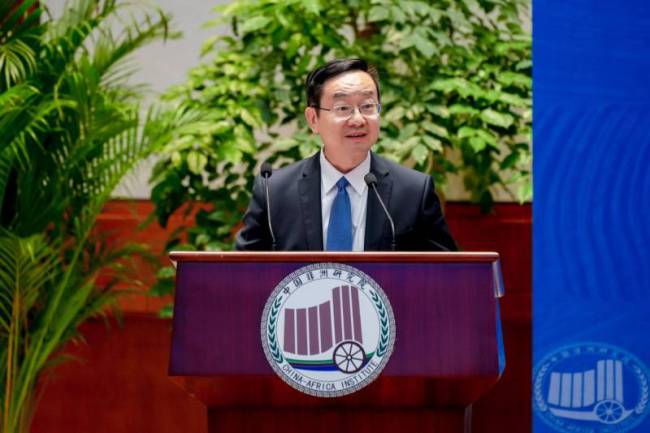
Gao Xiang is delivering a speech
Gao Xiang extended a warm welcome to the guests and congratulated on the opening of the 2nd Conference on Dialogue Between Chinese and African Civilizations. He said, “Today, our world, our times and history are changing in ways like never before. The historical trends of peace, development, cooperation, and mutual benefit are unstoppable. Yet, the hegemonic, high-handed and bullying acts of using strength to intimidate the weak, taking from others by force and subterfuge, and playing zero-sum games are exerting grave harm, and the deficits in peace, development and governance have increased.”
“The Global Civilization Initiative (GCI) proposed by President Xi Jinping is based on the characteristics of the times and the development of human civilization. It is committed to address issues during the process of the modernization of human society, and infused with great confidence and strength in promoting harmony and coexistence of different civilizations and the progress of human civilization,” he said.
Gao Xiang highlighted that diversity spurs interaction among civilizations, which in turn promotes mutual learning and their further development. According to GCI, we advocate robust international people-to-people exchanges and cooperation. He said, “China and Africa should work together to implement GCI and to explore the building of a global network for people-to-people exchanges and cooperation, and to enrich the contents of exchanges and expand avenues of cooperation in order to advocate exchanges and mutual learning among civilizations. China is willing to support African countries in seeking of the development path that suits their own conditions, and share opportunities brought by Chinese modernization. China is willing to joint hands with our African brothers on the path of modernization for the building of a China-Africa community with a shared future. ”

Mr. Rahamtalla M. Osman is delivering a speech
Mr. Rahamtalla M. Osman, Permanent Representative of the African Union to China said, “GCI is another important public product offered by China to the international community in order to address global challenges and create a better future for mankind, alongside the Global Development Initiative and Global Security Initiative. It embodies the Chinese wisdom and Chinese approach and has pushed China's dialogue with world civilizations to a new height.”
Ambassador Osman said, “Throughout history, both African and Chinese civilizations are indispensable parts of human civilization. For thousands of years, with long history and solid foundation, African and Chinese civilizations have made great contributions to the development of human societies. In the history, western countries engaged in constant slavery and aggression against Africa under the camouflage of “civilizing mission”, and derogated Africa as the “continent without civilization”, and the African people as the “victims needed to be saved from suffering”. As a matter of fact, they had been playing tricks in the attempt to seize Africa's natural resources and enslave its people. However, the rapid development of Africa and its rising international status has once again proved the strong vitality of ancient African civilization. Indeed, African is displaying to the world its rich civilization and huge influence in their exchanges with the Chinese civilization.”
He expected further culture exchanges and mutual learning of civilization between China and Africa, hoping that the two sides could work together and make greater contribution to the course of human civilization.
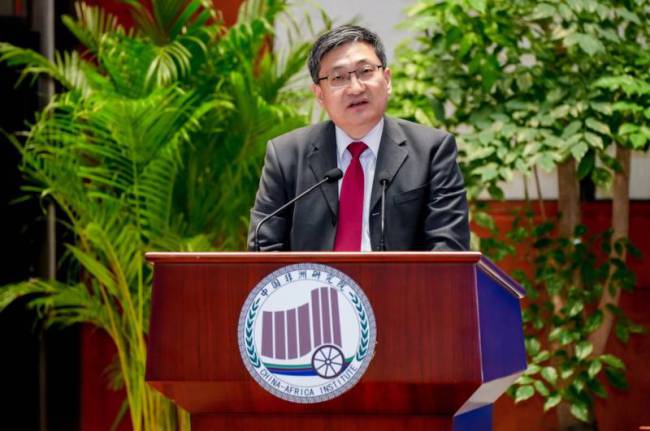
Liu Yuxi is delivering a speech
Liu Yuxi, Special Representative of the Chinese Government on African Affairs said, “Chinese modernization is the socialist modernization under the leadership of CPC. It has Chinese characteristics and suits for China itself. It helps China to achieve fast economic development and long-term social stability while promoting common prosperity and development for the building of a shared future for mankind. Chinese modernization is bond to provide more opportunities and bring benefits to more people including that of Africa. On the other hand, since the start of the new century, the AU has led African countries in accelerating the integration process and endogenous development. Many African countries have seen stable long-term economic growth, and Africa became one the fastest growing regions in the world. ”
“The development advantages of China and Africa are highly complementary, and the prospects for mutually beneficial cooperation are broad. As the most reliable strategic partner of Africa, China has been committed to support Africa by connecting its 40 years experience of opening and reform with African countries’ efforts in seeking sustainable development path, and connecting the Belt and Road Initiative (BRI) with AU’s Agenda 2063 and other development strategies in Africa,” said Liu.

Ambassador Monday Semaya Kenneth Kumba is delivering a speech
Monday Semaya Kenneth Kumba, ambassador of South Sudan to China suggested that the theme of the conference “Chinese Modernization and Africa's Development Path” shows the concerns of people around the world. China and Africa who are the strategic partners have carried out cooperation in a wide range of fields. With China’s support, Africa has become one of the fastest growing regions in the world.
“China's proposals for jointly building the BRI, the Global Development Initiative, the Global Security Initiative, and the Global Civilization Initiative are very important for Africa, and African countries fully support those initiatives. Africa has a positive view of China's role, as China does not interfere in our internal affairs and supports the independent development of African countries,” said ambassador Monday.
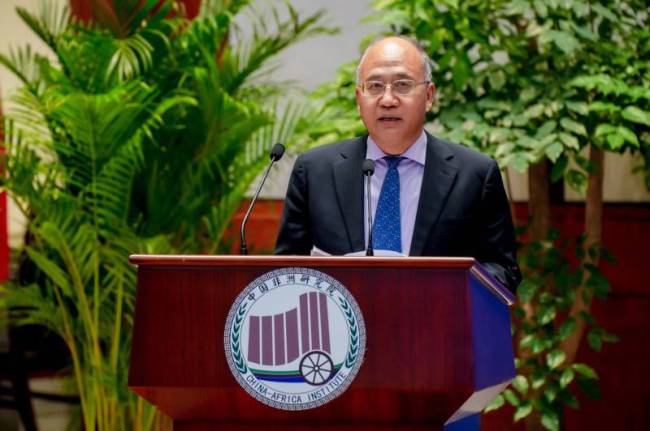
Zhen Zhanmin, Vice President of CASS is delivering a speech
At the opening ceremony, Gao Xiang presented four-volumes of Xi Jinping: The Governance of China (Chinese editions, English editions and French editions) to the African scholars.

Gao Xiang presenting President Xi's books to African scholars
“Thanks for this gift. This is very important for us. I started reading President Xi’s books years ago to try to learn about Xi’s thoughts. I found that there are many commonalities among Chinese leaders. Those books will be displayed in our university libraries for more people to read, so that it can better help us understand and study China,” said Professor Nkolo Foé, professor of the University of Yaoundé 1, Cameroon and member of the International Consultative Committee of China-Africa Institute (CAI).

Zhou Hong is delivering a speech
Gao Xiang said, “Xi’s important thoughts are regarded as the banner and soul of CPC and the Chinese nation in the new era. We are not going to understand today’s China, understand CPC, understand the Chinese miracle of modernization and the Chinese nation’s development path of great rejuvenation, unless we study the important thoughts of President Xi Jinping. I hope that by reading Xi’s books, we can deepen exchanges and mutual learning between Chinese and African civilization. I hope that it will help African scholars and friends better understand the CPC and the Chinese nation today. I hope that you can draw inspirations from Xi’s thoughts for realizing modernization of your own country.”
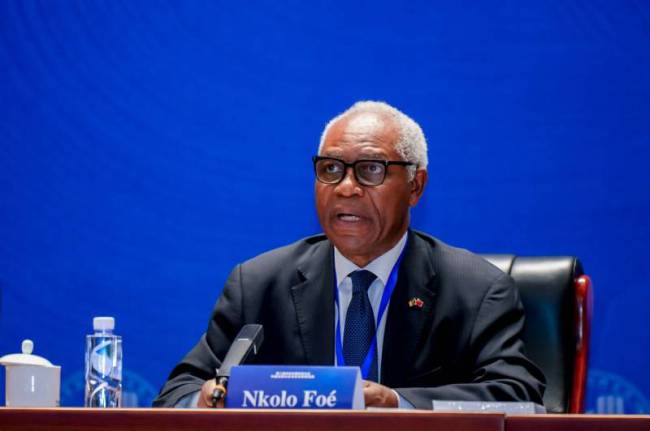
Professor Nkolo Foé is delivering a speech
Four scholars delivered speeches during the keynote session. Professor Nkolo Foé said, “Both China and Africa suffered from colonialism and imperialism, and have fought against it in their history. Now Africa has achieved independence and liberation, but we must not forget our history, especially the history of slavery. Today, we embarked on our new journey, we have equipped with new thoughts and we know what we fight for. Now the western countries are bringing pressures to Africa, hoping to see confrontations between Africa and China and Russia. This is wrong and we should stay alert.”
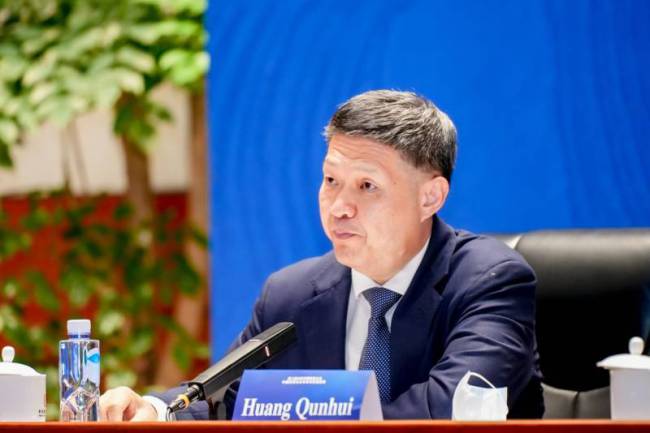
Huang Qunhui is delivering a speech
“Chinese modernization is a vital innovation that is based on four theories: people-centered theory, the national condition theory, the coordinated development and peaceful development. It sets a model for developing countries in seeking of their own modernization, and offers the Chinese wisdom for promoting world peace and human progress,” said Huang Qunhui, director and research fellow of the Institute of Economics, CASS.
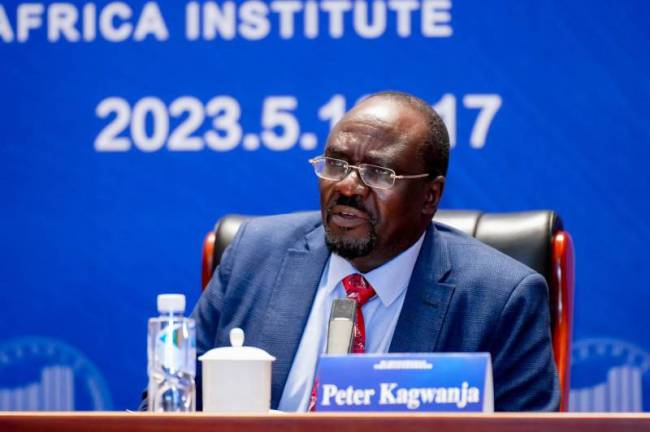
Professor Peter Kagwanja is delivering a speech
Peter Kagwanja, president of the Africa Policy Institute in Kenya said, “The ever-deepening China-Africa ties have advanced the fast growth in Africa. Now the exchanges between Chinese and African civilizations are closer than ever. The GDI, GSI and GCI proposed by China uphold the common interests of the world. Africa has the responsibility to support those initiatives and strive to safeguard the common interests of the world. Chinese modernization and African modernization are two different modernization models with different civilizations and paths, but they share common goals and directions. That is to jointly build a China-Africa community for shared future.”
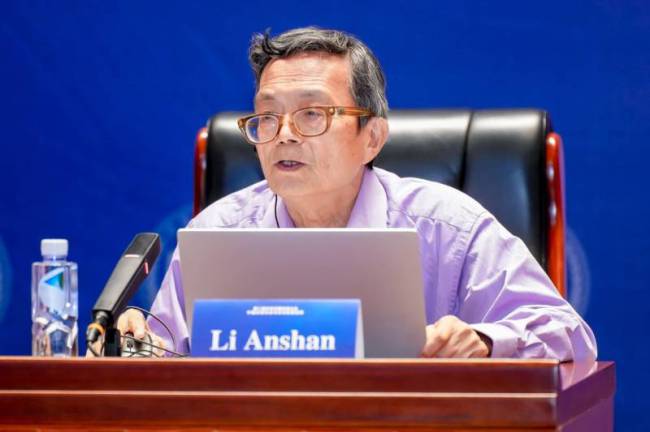
Li Anshan is delivering a speech
Li Anshan, professor of Peking University, and honorary president of Chinese Society of African Historical Studies said, “Since 1978,China has been making great efforts to achieve fast economic growth. Now it has transferred from a poor country to the world’s second economy. China’s development offers inspiration for Africa, because China and Africa have similar experiences, they both suffered from plundering and invasion by western countries, and have valiantly fought against it in their history. China is a country with huge population and rich civilization. It upholds socialism with Chinese characteristics and adopts a political system of its own. If a country like China can realize development, then a Southern country can also make it. If China and Africa could join hands, together they can build a better future.”
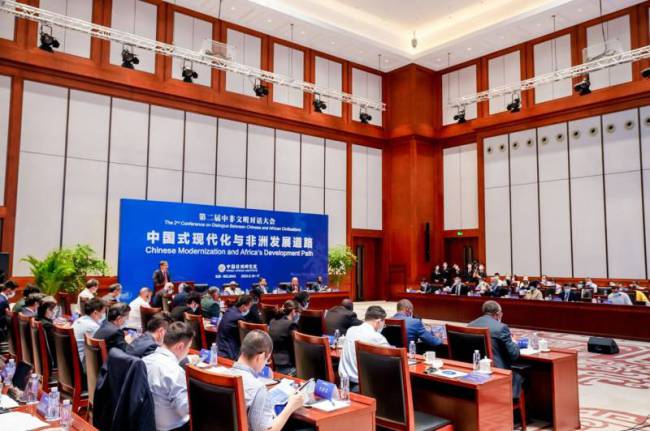

Chairman and speakers at session 1

Chairman and speakers at session 2
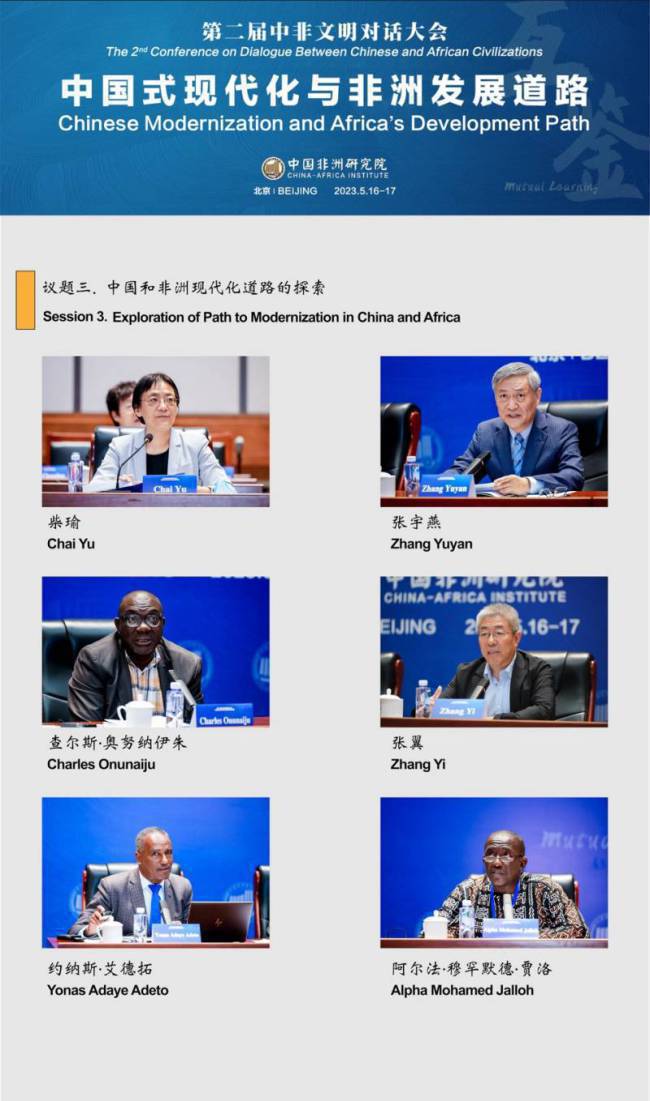
Chairman and speakers at session 3
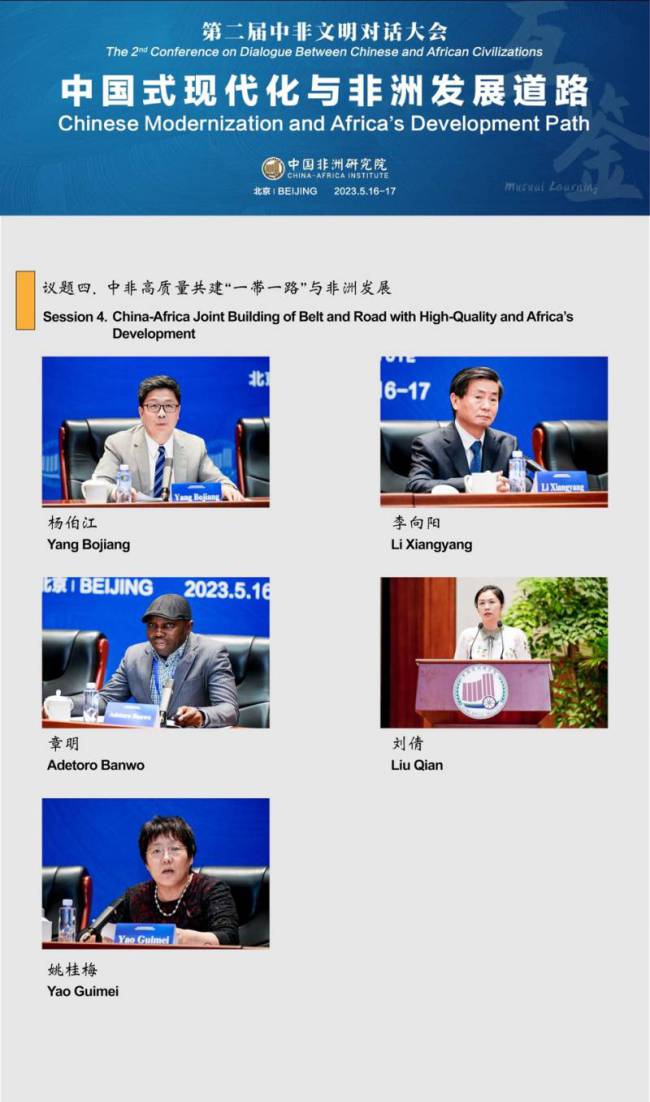
Chairman and speakers at session 4
There are four subtopics been discussed at the conference, namely Global Civilization Initiative and Mutual Learning Between Chinese and African Civilizations; The 60th Anniversary of the Organization of African Unity and Friendship Between China and Africa; Exploration of Path to Modernization in China and Africa; China-Africa Joint Building of Belt and Road with High-Quality and Africa’s Development.

Professor Charles Onunaiju is delivering a speech
Charles Onunaiju, director of the Center for China Studies in Nigeria and member of the International Consultative Committee of CAI pointed out in his concluding speech that only by starting from a historical perspective can we see opportunities brought by history, and reach consensus between countries.
“China has always been learning from the history and respecting the history; therefore, China is able to tell the truth and grab the opportunity brought by the history. By exchanges ideas at a conference like this, now we have learned why China has made such huge progress, and how it went through a development path within only decades while it took hundreds of years for developed countries to do so. As a scholar, I will bring back the stories we heard in China today and try to stop rumors spread by western countries. Thank the host for offering us this opportunity for exchange. I believe we will see more cooperation going on between China and Africa in the future,” said Professor Onunaiju.
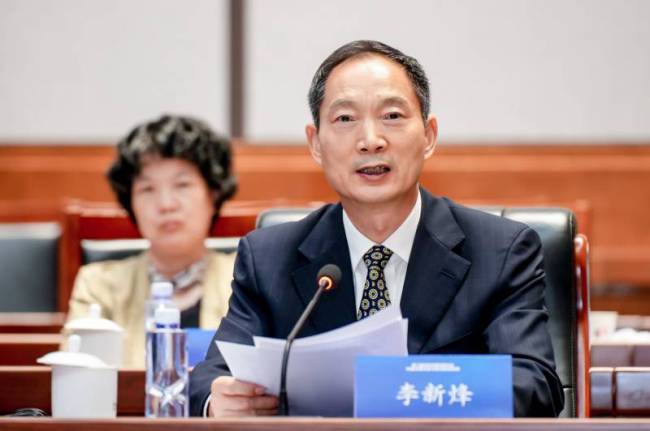
Li Xinfeng is delivering a speech
Li Xinfeng, Executive President of CAI said at the closing ceremony, “We had an in-depth discussion about how mutual learning of civilization play an important role in development, and we have agreed on the following four points. Firstly, both China and Africa are exploring their own paths to modernization, which is the key for exchanges and mutual learning between Chinese and African civilizations. Secondly, China-Africa high-quality construction of the BRI offers a practical platform for exchanges and mutual learning between Chinese and African civilizations. Thirdly, the implementation of GCI points out the development path for exchanges and mutual learning between Chinese and African civilizations. Lastly, Africa’s efforts in self-development and unity offers new opportunities for exchanges and mutual learning between Chinese and African civilizations. I believe that through joint efforts, the exchanges and mutual learning between Chinese and African civilizations will set an example for other civilizations in the world to engage in their exchanges and mutual learning, and therefore help to create a new form of human civilization.”
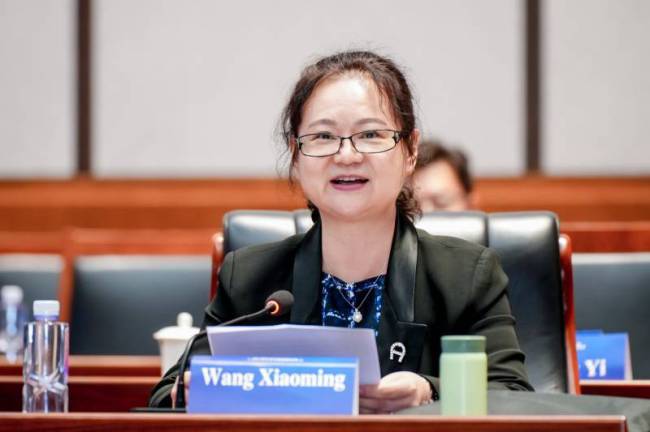
Wang Xiaoming, Vice President of CAI is delivering a speech
The conference was attended by more than 100 people, including Chinese scholars and journalists, 12 scholars from Cameroon, Kenya, Egypt, Senegal, Nigeria, Mali and Ethiopia and other African countries, as well as the Permanent Representative of the African Union to China, the Ambassador of the Republic of South Sudan to China, the Minister Counsellor of the People’s Democratic Republic of Algeria to China, and the First Counsellor of the Republic of Senegal to China. The event was broadcast live with more than 8,800 people watching online.


